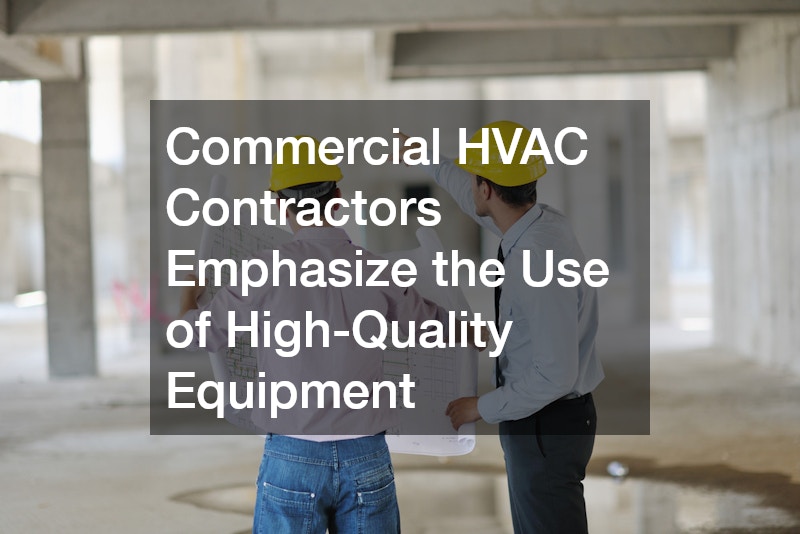When it comes to maintaining, repairing, or installing HVAC systems in commercial buildings, hiring the right professional is crucial. This article explores the top three reasons why engaging a commercial HVAC contractor is beneficial, guiding you through the decision-making process effortlessly. By understanding the qualifications, cost-effectiveness, and safety measures associated with commercial HVAC contractors, businesses can make informed decisions that enhance their building’s operations.
What Qualifications Should Commercial HVAC Contractors Have?
Industry Certifications and Licenses
Commercial HVAC contractors need to hold relevant industry certifications and licenses to demonstrate their competence and adherence to regulatory standards. These certifications, such as those from NATE or HVAC Excellence, ensure that the contractor has the necessary skills and knowledge.
Compliance with local regulations is also vital, ensuring that all installations and services are legally recognized and safe.
Beyond certifications, the ability of a contractor to stay updated with industry advancements reflects professionalism. This ongoing education means contractors can implement the latest energy-efficient technologies, benefiting commercial clients. Licensing also holds contractors accountable to industry standards, providing peace of mind to clients.
Being certified and licensed protects both the client and contractor in cases of disputes or if issues arise during or after a project. It also simplifies insurance claims, as insurers often require proof of compliance in the event of damage or accidents. Overall, these qualifications are essential indicators of reliability and expertise.
Experience and Specialization
A contractor’s experience and specialization are pivotal when dealing with complex HVAC systems used in commercial settings. Experienced contractors have likely encountered a range of potential challenges and know how to address them efficiently. Specialization in certain types of systems, such as VRF systems or chillers, can ensure optimal performance and longevity.
Contractors with substantial experience bring insights from past projects that can inform better decision-making for future solutions. This experience allows them to anticipate potential issues before they manifest, proactively maintaining the health of the HVAC systems. Their industry insights and troubleshooting skills contribute significantly to operational efficiency.
How Do Commercial HVAC Contractors Ensure Cost-Effectiveness?
Energy-Efficient Solutions
Commercial HVAC contractors often recommend energy-efficient solutions that significantly reduce operational costs for businesses. By implementing high-efficiency HVAC systems, businesses can enjoy substantial savings on energy bills. These advanced systems not only reduce consumption but also contribute positively to a company’s environmental goals.
Energy-efficient technologies include smart thermostats and energy management systems that optimize HVAC performance. Such investments, while initially costly, pay off over time through reduced energy consumption and lower utility bills. Contractors knowledgeable in these systems can provide invaluable advice on the best solutions available.
Moreover, ensuring that commercial properties meet or exceed energy efficiency standards can enhance the corporate image and appeal to eco-conscious clients and partners. This alignment with sustainability trends can strengthen market position and improve public perception. Thus, embracing energy efficiency is not only fiscally prudent but also strategically advantageous.
Preventative Maintenance Plans
One of the most effective ways contractors create value is through implementing regular preventative maintenance plans. Such plans minimize the risk of unexpected breakdowns and costly emergency repairs by keeping systems in optimal condition. Regular inspections and servicing help identify potential issues before they escalate into significant problems.
A well-maintained HVAC system runs more efficiently, resulting in lower energy usage and expenses. Contractors who offer comprehensive maintenance plans can customize services to align with the unique demands of a business and its building infrastructure. This proactive approach extends the lifespan of the HVAC equipment, safeguarding the business’s investment over the long term.
What Safety Measures Do Commercial HVAC Contractors Follow?
Adherence to Safety Standards
Commercial HVAC contractors must adhere to safety standards and regulations to ensure the well-being of both workers and building occupants. Compliance with OSHA and other safety regulations is non-negotiable, reducing the risk of accidents and hazards. By prioritizing safety, contractors protect their clients and employees alike, mitigating liabilities.
Regular audits and safety checks are integral to maintaining and improving safety standards on HVAC projects. Contractors incorporate these assessments into their routine operations to comply with legal standards and industry best practices. Adherence to safety standards not only safeguards workers but also enhances the contractor’s reputation in the industry.
Safety adherence extends to the use of personal protective equipment (PPE) and the latest safe work practices. Contractors committed to safety invest in continuous improvement of their safety protocols to adapt to new tools, techniques, and regulations. By doing so, they prevent accidents, minimize downtime, and avoid potential legal issues.
Use of High-Quality Equipment
Commercial HVAC contractors emphasize the use of high-quality equipment to ensure reliability and safety in their projects. Advanced equipment not only enhances the performance and efficiency of HVAC systems but also reduces the likelihood of failures. The use of reputable brands and cutting-edge technology reflects a contractor’s commitment to excellence.
High-quality equipment plays a crucial role in meeting specific performance requirements and adhering to stringent industry standards. Such equipment is often more robust and capable of withstanding the demands of commercial applications. Investing in quality technology also translates to longer system lifespans and lower maintenance costs.
Hiring a commercial HVAC contractor presents numerous advantages, from ensuring compliance and safety to optimizing cost-effectiveness. By assessing their qualifications, understanding their approach to cost management, and recognizing their commitment to safety, businesses can confidently entrust their HVAC needs to professionals, leading to improved efficiency and reliability. Ultimately, these contractors not only maintain a building’s HVAC systems but also enhance its operational and financial performance.
.

